If you love dessert toppings, you might know Cool Whip. It’s a favorite in the US. But, it’s not easy to find in the UK.
Cool Whip is a big hit in the US. It’s a go-to for many families. But, why can’t you find it in the UK?
This article will tell you why Cool Whip is banned in the UK. We’ll look at the differences between US and UK dessert markets. You’ll learn all about this popular topping.
Contents
- 1 The Popular American Dessert Topping
- 2 Why is Cool Whip Banned in the UK?
- 3 Controversial Ingredients in Cool Whip
- 4 Health Implications of Cool Whip Consumption
- 5 Alternatives to Cool Whip for UK Consumers and Travelers
- 6 Conclusion
- 7 FAQ
- 7.1 What is Cool Whip, and why is it popular in the US?
- 7.2 Why is Cool Whip banned in the UK?
- 7.3 What are the main ingredients in Cool Whip that cause concern?
- 7.4 Are there health implications associated with consuming Cool Whip?
- 7.5 Can UK consumers find alternatives to Cool Whip?
- 7.6 Is Cool Whip available for purchase online or through import?
- 7.7 How do US and UK food regulations differ regarding dessert toppings like Cool Whip?
The Popular American Dessert Topping
Cool Whip is a favorite in American desserts, loved at holidays and family dinners. Its ease, long shelf life, and versatility make it a hit. It goes well with many desserts.
It’s great on pies, cakes, and fruit salads. It’s also key in desserts like parfaits and trifles. Its consistent quality and ease of use make it a household favorite.
| Dessert | Common Cool Whip Pairing |
|---|---|
| Pies | Apple, Pumpkin, Cherry |
| Cakes | Carrot, Chocolate, Cheesecake |
| Fruit Salads | Strawberry, Blueberry, Raspberry |
Cool Whip’s lasting popularity in the US shows its cultural impact. It’s a go-to for topping family favorites or new recipes. It’s a trusted and tasty choice.
Why is Cool Whip Banned in the UK?
Cool Whip, a favorite in the US, is not found in the UK. This is because of different food rules. The UK is stricter about what goes into food and how it’s labeled.
Cool Whip’s ingredients and how they’re made are the main reasons for its ban. The UK’s food rules don’t allow some of Cool Whip’s components. They also have stricter rules for labeling.
One big difference is in food additives. Cool Whip has partially hydrogenated oils to last longer and feel better. But, these oils have trans fats, which are bad for health.
The UK is very careful about trans fats. They check food with these fats very closely before it can be sold. Below, you’ll see how food rules differ between the US and UK.
| Regulatory Aspect | US | UK |
|---|---|---|
| Trans Fats Regulation | Allowed in limited amounts | Strictly regulated, almost banned |
| Food Additive Approval | Less stringent approval process | Rigorous testing and approval required |
| Labeling Requirements | Less detailed labeling for certain ingredients | Detailed labeling required, including allergens and certain additives |
The UK’s careful rules mean Cool Whip can’t be sold there. People in the UK looking for similar toppings have to choose other options that meet local rules.
Knowing about these differences helps you make better choices. This is especially true if you move between the US and UK or buy food from other countries.
Controversial Ingredients in Cool Whip
It’s important to know what’s in Cool Whip to understand why it’s banned in the UK. This popular dessert topping in the US has ingredients that worry many. Both consumers and health groups have concerns.
Cool Whip includes partially hydrogenated coconut oil, high fructose corn syrup, and artificial flavorings. These have sparked debates over health risks and unclear labels.
Labeling Requirements
Cool Whip doesn’t meet UK labeling rules. It has ingredients not listed clearly or differently in the US. This confuses many people.
- Partially hydrogenated oils are not clearly labeled.
- Artificial colors and flavors are not specified.
- High fructose corn syrup is used without clear indication of its health impacts.
Composition Standards
Cool Whip also doesn’t meet UK food standards. Ingredients like partially hydrogenated coconut oil don’t follow UK rules.
| Ingredient | US Labeling | UK Compliance |
|---|---|---|
| Partially Hydrogenated Coconut Oil | Allowed | Not Compliant |
| High Fructose Corn Syrup | Common | Restricted |
| Artificial Flavorings | Permitted | Requires Specific Labeling |
In summary, Cool Whip’s ingredients and labels don’t follow UK rules, leading to its ban. UK consumers are protected from harmful ingredients. But, US consumers are still exposed.
Health Implications of Cool Whip Consumption
It’s important to know how Cool Whip affects our health. This popular dessert topping has ingredients that can harm us if we eat too much of it.
Cool Whip has a lot of sugar. Eating too much sugar can lead to obesity and diabetes. It also has artificial flavorings and preservatives, which some people might not like.
The table below compares the nutritional content of Cool Whip with a healthier alternative, whipped cream.
| Nutritional Content | Cool Whip | Whipped Cream |
|---|---|---|
| Calories per serving | 25 | 50 (less if using low-fat cream) |
| Sugar Content | High (contains high fructose corn syrup) | Low (naturally occurring lactose) |
| Preservatives | Contains artificial preservatives | No artificial preservatives |
Eating Cool Whip often means more artificial ingredients and high fructose corn syrup. These can cause health problems. It’s good to know this and choose better options.

Knowing what’s in Cool Whip helps us make better choices for our health and our families.
Alternatives to Cool Whip for UK Consumers and Travelers
UK consumers and travelers have many options besides Cool Whip. If you’re searching for similar dessert toppings, you’re in luck. There are several choices available in both the UK and US markets.
Whipped cream made from heavy cream is a popular choice. It’s easy to make and sweeten with sugar or other sweeteners. Many UK brands offer high-quality whipped cream. It can be used as a direct substitute for Cool Whip.
| Product | Description | Availability |
|---|---|---|
| Elmlea Whipped Cream | A dairy whipped cream alternative | UK |
| Rich Whip | A non-dairy whipped topping | US, UK |
| Yoplait Whipped Cream | A yogurt-based whipped cream | US |
These alternatives give you a variety of options. They’re great for those who want to avoid Cool Whip’s ingredients or prefer a more natural topping. Whether you’re in the UK or traveling, finding a suitable substitute is easy.
When picking an alternative, look at the ingredients and nutritional content. Some may have less fat or calories. Others might have a more natural ingredient list.
Conclusion
Cool Whip, a favorite dessert topping in the US, is not allowed in the UK. This is because of its ingredients and health concerns. The UK’s strict food laws have made it illegal, keeping it out of UK stores.
If you’re from the US visiting the UK, finding other dessert toppings might be needed. Luckily, there are many options that follow UK rules and taste great. You can try whipped cream or other toppings found in the UK.
Knowing what’s in your food and the laws around it is key. The Cool Whip ban in the UK shows the importance of checking ingredients and following local rules. Whether you’re in the US or traveling to the UK, choosing healthy foods is vital for your health.
FAQ
What is Cool Whip, and why is it popular in the US?
Cool Whip is a dessert topping made by Kraft Foods. It’s loved in the US for its convenience and versatility. People enjoy it because it’s easy to use and goes well with many desserts.
Why is Cool Whip banned in the UK?
Cool Whip is banned in the UK because it doesn’t meet UK food standards. The ingredients and labeling are different from what the US allows.
What are the main ingredients in Cool Whip that cause concern?
Cool Whip contains high fructose corn syrup, artificial flavorings, and certain emulsifiers. These ingredients don’t meet UK food regulations, causing health and safety worries.
Are there health implications associated with consuming Cool Whip?
Eating too much Cool Whip can be bad for your health. It has a lot of sugar, artificial ingredients, and can affect your digestion.
Can UK consumers find alternatives to Cool Whip?
Yes, UK consumers can choose from other dessert toppings and whipped cream alternatives. These options meet UK food regulations and might be healthier.
Is Cool Whip available for purchase online or through import?
You can buy Cool Whip online or import it, but be careful. There are risks and regulatory issues with importing food that doesn’t meet local standards.
How do US and UK food regulations differ regarding dessert toppings like Cool Whip?
The US and UK have different rules for food ingredients, labeling, and standards. This means products like Cool Whip are available in one market but not the other.

Marcellus Stark is an investigative journalist from San Francisco, USA. He writes about global bans, rules, and unusual laws. He shares clear, interesting, and well-researched stories that help readers understand surprising facts worldwide.

